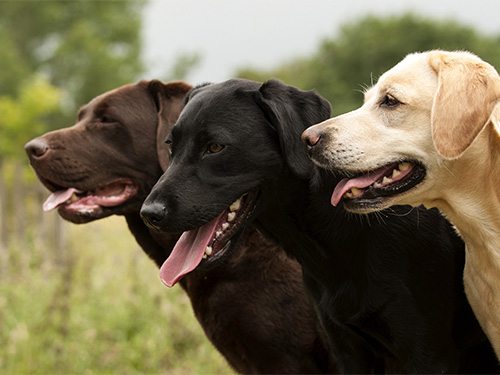Hunting Dogs: Setting the Foundation for Success
Aug 19, 2024

Preparing to take your new hunting dog into the field? The journey from playful puppy to skilled hunting partner requires patience, consistency, and dedication, particularly during the critical first year. Building a strong training foundation ensures your dog will perform safely and effectively when it matters most.
Here are five essential tips to help your new hunting partner reach their full potential.
Establish yourself as the pack leader
Dogs naturally follow a pack hierarchy, and as the owner, you must establish yourself as the leader. This not only gives your dog a sense of security but also fosters a strong bond of trust. A confident dog will be more willing to work and will be eager to please, which is crucial in hunting scenarios. Leadership doesn’t mean dominance — it’s about consistency, clear communication, and fair expectations.
Master basic commands early
Before venturing into advanced hunting drills, your dog must have a firm grasp of basic obedience. Commands like “sit,” “stay,” “come,” “heel,” and “down” form the foundation of all future training. Practice these daily, using positive reinforcement to encourage quick and accurate responses. The time spent mastering these basics will pay off immensely when you transition to field-specific training.
Expose your dog to new environments
A well-socialized dog is a confident hunter. Begin by introducing your dog to various environments they’ll encounter during hunts — water, fields, boats, blinds, and even different types of wildlife. Gradual exposure to the sound of gunfire is crucial; start from a distance and progressively get closer to ensure your dog remains calm and focused. Regularly varying your dog’s experiences will make them more adaptable and reduce the likelihood of being startled in the field.
Utilize training tools wisely
Training tools like whistles, decoys, and retrieval dummies are invaluable for honing your dog’s skills. A whistle can communicate commands from a distance, with different pitches signaling different actions, such as “come” or “sit.” Decoys and scent training aids simulate real hunting scenarios, helping your dog learn to retrieve game both on land and in water. Consistent practice with these tools will enhance your dog’s responsiveness and reliability during actual hunts.
Incorporate physical and mental exercises
Hunting requires endurance, strength, and mental sharpness. Integrate regular physical exercises such as running, swimming, and agility drills into your training regimen to build your dog’s stamina and fitness. Additionally, engage your dog’s mind with puzzle toys, scent games, and problem-solving exercises to keep them mentally sharp. A well-rounded training program that combines physical and mental challenges will prepare your dog for the rigors of hunting.
Training a hunting dog is a rewarding but demanding process. The investment of time and effort will result in a skilled, loyal companion that enhances every hunting experience. For all your hunting supplies, dog nutrition, and training tools, visit your local Co-op.
Find the nearest location here. For more content like this, check out the latest issue of The Cooperator.
Here are five essential tips to help your new hunting partner reach their full potential.
Establish yourself as the pack leader
Dogs naturally follow a pack hierarchy, and as the owner, you must establish yourself as the leader. This not only gives your dog a sense of security but also fosters a strong bond of trust. A confident dog will be more willing to work and will be eager to please, which is crucial in hunting scenarios. Leadership doesn’t mean dominance — it’s about consistency, clear communication, and fair expectations.
Master basic commands early
Before venturing into advanced hunting drills, your dog must have a firm grasp of basic obedience. Commands like “sit,” “stay,” “come,” “heel,” and “down” form the foundation of all future training. Practice these daily, using positive reinforcement to encourage quick and accurate responses. The time spent mastering these basics will pay off immensely when you transition to field-specific training.
Expose your dog to new environments
A well-socialized dog is a confident hunter. Begin by introducing your dog to various environments they’ll encounter during hunts — water, fields, boats, blinds, and even different types of wildlife. Gradual exposure to the sound of gunfire is crucial; start from a distance and progressively get closer to ensure your dog remains calm and focused. Regularly varying your dog’s experiences will make them more adaptable and reduce the likelihood of being startled in the field.
Utilize training tools wisely
Training tools like whistles, decoys, and retrieval dummies are invaluable for honing your dog’s skills. A whistle can communicate commands from a distance, with different pitches signaling different actions, such as “come” or “sit.” Decoys and scent training aids simulate real hunting scenarios, helping your dog learn to retrieve game both on land and in water. Consistent practice with these tools will enhance your dog’s responsiveness and reliability during actual hunts.
Incorporate physical and mental exercises
Hunting requires endurance, strength, and mental sharpness. Integrate regular physical exercises such as running, swimming, and agility drills into your training regimen to build your dog’s stamina and fitness. Additionally, engage your dog’s mind with puzzle toys, scent games, and problem-solving exercises to keep them mentally sharp. A well-rounded training program that combines physical and mental challenges will prepare your dog for the rigors of hunting.
Training a hunting dog is a rewarding but demanding process. The investment of time and effort will result in a skilled, loyal companion that enhances every hunting experience. For all your hunting supplies, dog nutrition, and training tools, visit your local Co-op.
Find the nearest location here. For more content like this, check out the latest issue of The Cooperator.